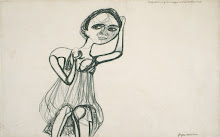Monday, January 09, 2017
"A friend of mine, depressed in the wake of his divorce, had recently admitted that he often felt moved to tears by the concern for his health and well-being expressed in the phraseology of adverts and food packaging, and by the automated voices on trains and buses, apparently anxious that he might miss his stop; he actually felt something akin to love, he said, for the female voice that guided him while he was driving his car, so much more devotedly than his wife ever had. There has been a great harvest, he said, of language and information from life, and it may have become the case that the faux-human was growing more substantial and more relational than the original, that there was more tenderness to be had from a machine than from one’s fellow man. After all, the mechanised interface was the distillation not of one human but of many....What was soothing, he believed, was the very fact that this oceanic chorus was affixed in no one person, that it seemed to come from everywhere and nowhere: he recognised that a lot of people found this idea maddening, but for him the erosion of individuality was also the erosion of the power to hurt."~Rachel Cusk, Transit
